

Catherine Crump: The small and surprisingly dangerous detail the police track about you. Civil Liberties Groups Appeal Ruling Over Automatic License Plate Reader Data. The Electronic Frontier Foundation and the ACLU Foundation of Southern California are taking the fight over automatic license plate reader (ALPR) data to the next level by asking the California Court of Appeal to rule that the public has a right to know how Los Angeles cops are tracking their locations.
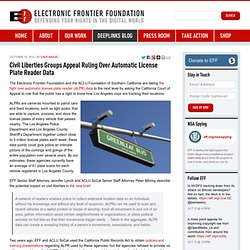
ALPRs are cameras mounted to patrol cars and fixed locations, such as light poles, that are able to capture, process, and store the license plates of every vehicle that passes nearby. The Los Angeles Police Department and Los Angeles County Sheriff’s Department together collect close to 3 million license plates each week; these data points could give police an intimate picture of the comings and goings of the entire population over several years. By our estimates, these agencies currently have an average of 61 plate scans for each vehicle registered in Los Angeles County. Who were they investigating? Every car in Los Angeles. License plate data stir privacy concerns. National License Plate Recognition Database: What It Is and Why It’s a Bad Idea.
UPDATE—February 19, 2014: According to the Washington Post, just days after the story broke, DHS shelved its plans to create or tap into a national database of license plate recognition data.
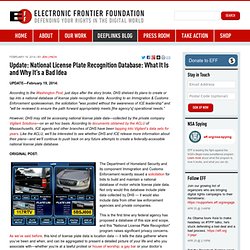
According to an Immigration & Customs Enforcement spokeswoman, the solicitation "was posted without the awareness of ICE leadership" and "will be reviewed to ensure the path forward appropriately meets [the agency's] operational needs.” However, DHS may still be accessing national license plate data—collected by the private company Vigilant Solutions—on an ad hoc basis. According to documents obtained by the ACLU of Massachusetts, ICE agents and other branches of DHS have been tapping into Vigilant’s data sets for years. Like the ACLU, we'll be interested to see whether DHS and ICE release more information about their plans—and we'll continue to push back on any future attempts to create a federally-accessible national license plate database. Automatic License Plate Readers (ALPR) Check out this video to see how ALPR technology works: Please note that by playing this clip You Tube and Google will place a long-term cookie on your computer.
Please see You Tube's privacy statement on their website and Google's privacy statement on theirs to learn more. To view the ACLU's privacy statement, click here . Automatic License Plate Recognition (ALPR) systems are the new rage in law enforcement worldwide . The cameras -- affixed to a police car or static locations like telephone poles, or under bridges -- capture thousands of license plates per minute, storing information in databases, recording not only the license plate number, but also the GPS location where each car was "pinged. " Indeed, the ALPR surveillance net is already woven tightly in some areas. Corporate data mining of our travel data Governments have for some time purchased our credit , criminal, residential, employment and other data from private corporations. License plate readers and the rise of a surveillance industry.
ACLU Sues Over License Plate Readers. Your car, tracked: the rapid rise of license plate readers. This feature originally ran on August 15, 2012.
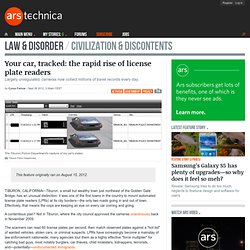
TIBURON, CALIFORNIA—Tiburon, a small but wealthy town just northeast of the Golden Gate Bridge, has an unusual distinction: it was one of the first towns in the country to mount automated license plate readers (LPRs) at its city borders—the only two roads going in and out of town. Effectively, that means the cops are keeping an eye on every car coming and going. A contentious plan? Not in Tiburon, where the city council approved the cameras unanimously back in November 2009. The scanners can read 60 license plates per second, then match observed plates against a "hot list" of wanted vehicles, stolen cars, or criminal suspects. Today, tens of thousands of LPRs are being used by law enforcement agencies all over the country—practically every week, local media around the country report on some LPR expansion.
Roadside cameras suffer from large gaps in coverage, police admit. A police car equipped with automatic number plate recognition cameras on patrol in Ipswich, Suffolk, during the hunt for the killer of five women in 2006.
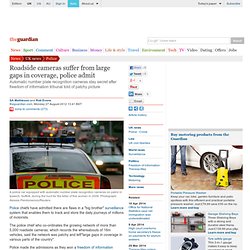
Photograph: Alessia Pierdomenico/Reuters Police chiefs have admitted there are flaws in a "big brother" surveillance system that enables them to track and store the daily journeys of millions of motorists. LicencePlateReaders. How Automatic License Plate Recognition Tracks Your Steps. As the surveillance state continues to expand, the push to track the movement of individuals across state borders has also expanded.
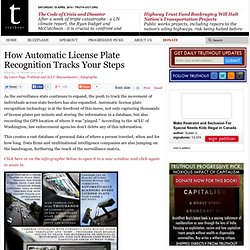
Automatic license plate recognition technology is at the forefront of this move, not only capturing thousands of license plates per minute and storing the information in a database, but also recording the GPS location of where it was "pinged. " According to the ACLU of Washington, law enforcement agencies don't delete any of this information. This creates a vast database of personal data of where a person traveled, when and for how long.